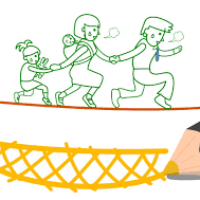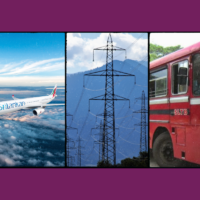Trade Union Actions, Wages and Inflation: Rights versus Responsibilities
Introduction
“The labour movement was the principal force that transformed misery and despair into hope and progress” – Martin Luther King Jr
Trade unions play a crucial role in any society. Recent, not so successful efforts of trade unions to minimize the adverse effects of debt restructuring on employee provident fund (EPF) prompted me to write this short article. The way trade unions are sanctioned to function is reflective of the lab or standards of a modern society. Just like democracy, the concept of labour standards is controversial and often misunderstood. However, the progress of a country depends on having a good set of labour standards and wholehearted implementation of them. Respecting such labour standards has number of positive social benefits, as it; (i) builds respect for the law, (ii) increases respect for human rights, (iii) promotes decent work, (iv) improves dialogue between social partners, and (v) improves prospects for exports as importing countries increasingly demand respect for international labour standards (ILS) including core labour standards (CLS).
CLS are a set of four internationally recognized basic rights and principles that include: (i) freedom of association and the effective recognition of the right to collective bargaining, (ii) elimination of all forms of forced or compulsory labour, (iii) effective abolition of child labour, and (iv) elimination of discrimination in respect of employment and occupation. Sri Lanka has effectively eliminated forced labour and minimized the use of child labour. However, mass scale poverty imposed on the Sri Lankan society in the recent times may increase child labour and this is an important matter that need the attention of the relevant authorities and civil society organizations. Sri Lanka has lot more to do to achieve the elimination of discrimination in employment and occupation. Discriminations in employment and occupation in relation to gender, ethnicity, religion geographic origin (rural versus urban) and political affiliations are still widespread. This article, however, focuses on the practice of freedom of association and collective bargaining in Sri Lanka.
Simple Economics of Wage Determination
The main demand of the trade union actions in Sri Lanka is salary increase while job security, working conditions health and safety standards etc., are also demanded occasionally. Some trade union actions, and student protest are also aimed at prevention of private education. This article, however, discusses only the trade union actions related to salary increase. One needs to understand as to how the wages are determined in the economy to comprehend the effect of trade union actions. Towards this end let’s assume a profit maximizing firm. Price of any input at the equilibrium is determined by the following equation:
Price of input = Marginal product of the input X Price of output
The marginal product (MP) is the incremental increase in output as a result of small increase in input. Those who are conversant with mathematics know that MP is a derivative of the production function with respect to the input in question. Labor being one of the factors of production in the economy and wage is the price of labour, one can rewrite this equation for the macro economy as follows:
Wage rate = Marginal product of labour X Price index
In converting the firm level equation to the entire economy, marginal product of labour (MPL) should be calculated for the entire economy or for a sector. If the equation is applied for the entire economy the price index will be consumer or producer price indices, for example. If we apply this equation for agriculture sector, MP should be estimated for the entire sector and price index would be food price index.
Now that we are familiar with the basic concept of wage determination let’s analyse the effect of trade union actions. Assume that wages are increased as a result of collective bargaining, either MPL or Price index or both should be increased to balance the equation. Assume, that wages increase without increasing MPL. Then price index should increase to balance the equation. Thus, increasing wages without increasing MPL will result in INFLATION – increase in price index. Most important common characteristic of the trade union actions in Sri Lanka is that salary increase are considered as a “right’ and related to the cost of living. There are hardly any efforts by trade unions to improve labour productivity. Eventually, every trade union action that result in higher salaries, without improving MPL, will result in inflation and erosion of real income of the workers.
What are the impacts of this wage driven inflation? First, real income and consumption gains of those who involve in the trade union action will disappear within short period. Thus, the trade union action only provides a temporary relief. Second, the rest of the workers will feel the pressure of inflation, and comparatively low salaries received by them, and they will also initiate trade union actions. For example, doctors’ strikes are often followed by the strikes by nurses. Since no increase in MPL, further inflation takes place resulting in a vicious cycle. Third, most of the public sector workers are the one who take trade union actions and private sector workers and informal sector workers face the same inflation. Wages in these sections take time to adjust and until these adjustments take place workers in these sectors suffer welfare losses due to trade union actions of public sector workers. Forth, pensioners who have fixed incomes will suffer from the higher prices. Thus, the entire economy suffers from the collective bargaining and resultant salary increase unless the wage increases are associated with commensurate increase in labour productivity.
Rights versus Responsibilities
I never heard or seen any written material by Sri Lankan trade union leaders which refers to improving labour productivity in my professional career of over 35 years. Importance of labour productivity was implanted in my mind when I was in US as a graduate student. I accidently listened to a discussion of trade union leaders with the management of Boeing company in 1996. Boeing Commercial Airplanes—a key unit of the Boeing Company—is in many ways a remarkable American success story. For much of the twentieth century, its name was synonymous with pioneering advances in commercial flight. Toward the end of the century, it faced a more uncertain and fast-changing competitive environment. Boeing had to fight hard to maintain its reputation as one of the world’s great companies. It altered management strategies, introduced technological changes, extensive outsourcing, and add broad global partnerships. It also underwent through massive layoffs, and drastically altered ways of working. These changes produced stress and turbulence in the lives of workers and managers alike[1].
Trade union leaders show the productivity increase in the above-mentioned discussion, profit associated with such increase and requested only a percentage of the increased profit as salary increase. They pointed out the reduction in labour days to produce an aero plane as the measure of productivity increase. Negotiation was mainly on the % of profits to be given to workers as salary increase. I was highly impressed with the union leaders’ recognition of the role of capital and avoiding the bankruptcy of the company. The balance approach they adopted considered workers’ rights as well as importance of sustaining the company as a source of livelihood on thousands of workers. The responsible manner in which trade union leaders handle the negotiation registered in my mind and I have been closely watching trade union actions in Sri Lanka since then. I was not able to find a single occasion in which union leaders showed productivity increase as a bargaining tool or even put any efforts to increase labour productivity. To my knowledge, trade unions have not undertaken any awareness building activities to educate workers about the importance of efficiency, cost reduction and productivity improvements in the organizations they work.
What causes this difference? Is it our culture? Socialist thinking ingrained in minds of workers and trade union leaders? Poor economic literacy? Anti-business sentiments? A combination of these plus the power structure within the different sectors of the economy may perhaps explain as to why trade unions only focus on the rights and neglecting the responsibility of improving labor productivity to gain sustainable real income increases. Bargaining power of a trade union is mainly determined by the nature of the service. Doctors, CEB engineers, university teachers, nurses and other health sector workers, train engine drivers are examples of some categories of workers who have higher bargaining power. A quick review will reveal that demands of these trade unions are generally met and with little efforts workers in these sectors get higher salaries. In the one hand they will feel, after a while, that there is no real increase in their income. As explained earlier, the rest of the economy suffer from higher inflation as well as higher taxes to pay the increased salaries. Some other categories of workers such as school teachers, farmers, informal sector workers have less no bargaining power so their real salaries/incomes are far below those who have a higher bargaining power. Thus, trade union actions are one of the causes of inequality in the society.
They Way Forward
“I am a union worker; That means I am part of an organization that fight not only for my benefits, but for everyone’s benefit” – UNIONS SET STANDARDS- Shella Hogle
This unequal power in bargaining as well as “right based” thinking with total disregards to labour productivity eventually result in socially undesirable outcome akin to “Prisoners’ Dilemma” game, in game theory. The prisoner’s dilemma game describes a situation where, players acting selfishly will ultimately result in a socially undesirable outcome for all. The trade unions’ selfish behaviour in Sri Lanka has alienated them from the public and their ability to fight for just causes like protecting the pension benefits, equal sharing the burden of economic crisis has diminished substantially. Trade union leaders are harassed, prosecuted and event assassinated all over the world. They are generally seen as enemies of the (suppressive) governments and corporations. Public support is the best protection they have when they face suppressive governments and hostile corporations, particularly when the law and order is not proper, and judiciary and police are not independent. It is time for trade union leaders to revisit their approach to protect only their groups at the cost to others. Educating the workers about their responsibilities in improving productivity and efficiency and adopting a more comprehensive, cooperative, and ethical approach to protect the entire working class with acceptable approach to negotiations based on the contribution of the workers to the economy may provide a new beginning for the labour movement in Sri Lanka.
[1] Labor Unions at Boeing : Reflections on Our Findings in ‘Turbulence: Boeing and the Future of American Workers and Managers’ (Yale Press, 2010) and Developments Since Its Publication (zbw.eu)









